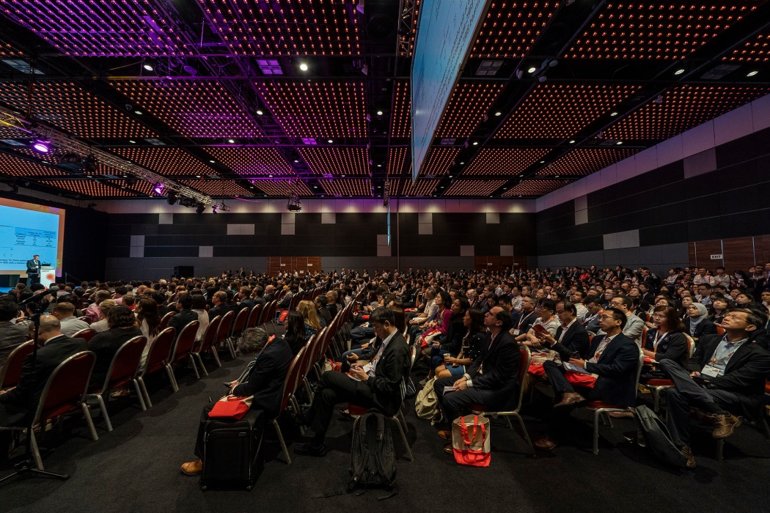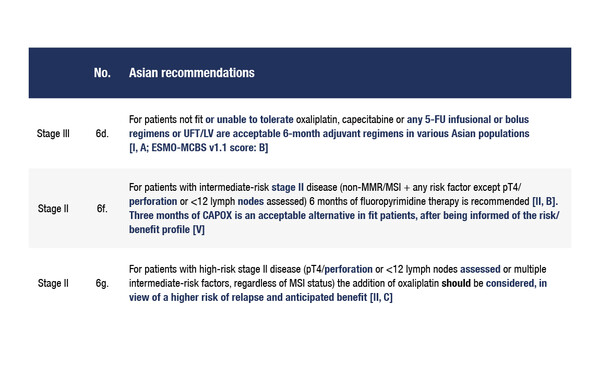Risk assessment and alternative fluoropyrimidine regimens are the main changes in the Pan-Asian adapted ESMO Clinical Practice Guidelines, reinforcing ESMO’s commitment in the region
Published earlier this year, the Pan-Asian adapted ESMO Clinical Practice Guidelines (PAGA) for the diagnosis, treatment and follow-up of patients with localised colon cancer (Ann Oncol. 2021 Aug 16;online ahead of print) are already being used in clinical practice across Asia, according to the guidelines’ first author, Prof. Takayuki Yoshino, National Cancer Center Hospital East, Kashiwa, Japan. In a presentation at the ESMO Asia Virtual Oncology Week 2021, Yoshino discusses the value of the PAGA and describes the main differences from the ESMO guidelines (Ann Oncol. 2020;31:1291–1305).
“To the best of my knowledge, there are currently no regional comprehensive clinical practice guidelines for Asian patients with localised colon cancer. These are the first to be prepared across different Asian countries that take Asian ethnicity into account,” says Yoshino.
During the development process of the document, there was considerable discussion among the Asian experts around the recommendations for risk assessment. Dihydropyrimidine dehydrogenase deficiency (DPD) occurs at a low incidence in Asian, compared with non-Asian, populations and there is no clear association between DPD and fluoropyrimidine (FP) toxicity. Because of this, the recommendation for DPD genotyping and phenotyping was modified to state that testing ‘may be considered’ before FP administration, but ‘should be implemented’ in patients who experience severe FP toxicity’.
Based on data from a Japanese study (J Clin Oncol. 2016;34:2906–2913), the recommendation around gene expression signature use was strengthened to indicate that gene expression signatures can be used to refine prognosis for stage II disease, but are not recommended for routine practice due to the lack of a predictive value for chemotherapy benefit. In terms of immunoscoring, which has been shown to have similar prognostic value in Asian and European populations, the recommendation has been clarified to state that immunoscoring can be used to refine prognosis in patients with localised colon cancer when used in conjunction with TNM scoring in stage II or stage III disease, although the predictive effect for adjuvant chemotherapy is uncertain.
Changes to treatment recommendations reflect differences in treatment practices and disease-risk definitions.
In stage III disease, because LV5FU2 is not widely used as adjuvant treatment in Asia, the recommendation for patients who are unable to tolerate oxaliplatin has been broadened to include a range of FP alternatives. In stage II colon cancer, the guideline has been adapted to include 3 months of CAPOX as an alternative to 6 months of FP in fit patients with intermediate-risk disease and also to clarify the recommendation for oxaliplatin in patients with high-risk disease.
“This guideline is essential reading for medical oncologists in Asian countries,” comments Yoshino. “The most critical issue for the implementation of the guidelines across the region is the difference in drug and testing availability in each Asian country and the costs of some treatments,” says Yoshino. “These factors will obviously impact some of the treatment strategies that can be adopted by individual countries.” In addition to guiding management decisions, Yoshino thinks that the guidelines will be invaluable for implementing or changing policy recommendations in Asian countries, leading to early approval of novel agents and ensuring their correct use.
The PAGA project was initiated in 2016 with the aim of tailoring ESMO Clinical Practice Guideline recommendations to ensure that they incorporate ethnic, scientific, socioeconomic and local practice elements to meet the needs of cancer patients in Asia. Building on successful collaborations with key opinion leaders from seven partner oncology societies in China, India, Japan, South Korea, Malaysia, Singapore and Taiwan, ESMO is now expanding the number of partners to ten, with the addition of societies from the Philippines, Indonesia and Thailand. On occasion of the ESMO Asia Virtual Oncology Week 2021, a dedicated web page has been launched where users can find all Pan-Asian Guidelines Adaptations produced so far in one single place.
Yoshino T. Early colon: Presentation of the Pan-Asian adapted ESMO Clinical Practice Guideline recommendations. ESMO Asia Virtual Oncology Week 2021
Pan-Asian adapted ESMO Clinical Practice Guidelines lecture on early colon cancer. ESMO Asia Virtual Oncology Week 2021, 21.11.21, h. 14:00 – 14:20 (Singapore time), Channel 1







